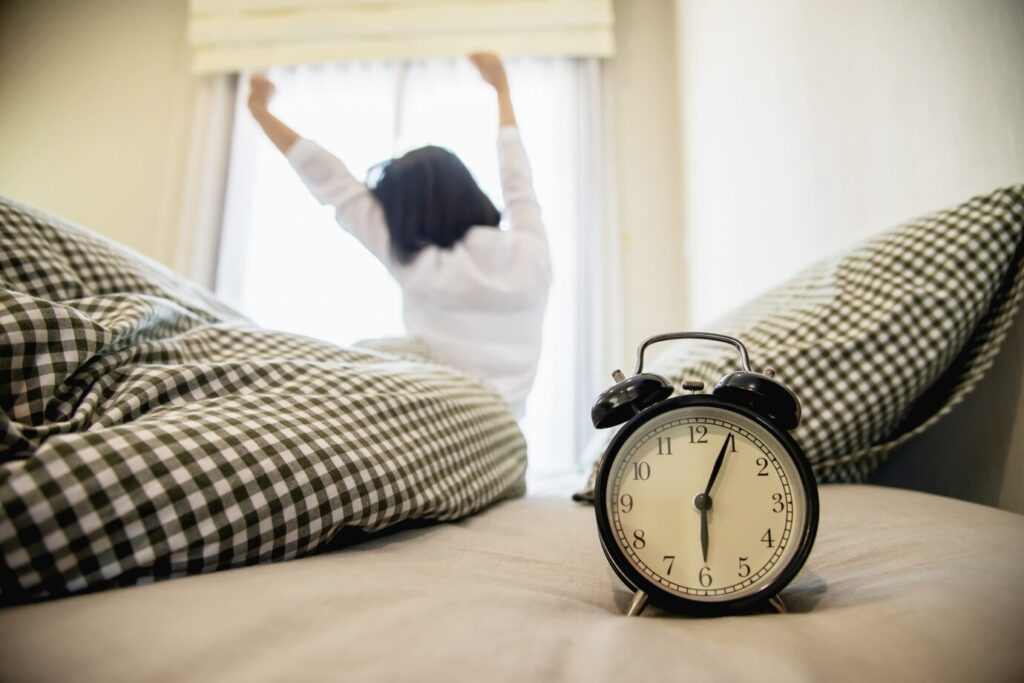Waking up at the right time can make all the difference in how you feel throughout the day. If you’ve ever woken up groggy, sluggish, or in a bad mood, it’s likely because you interrupted an important stage of your sleep cycle. So, understanding this, I mean how sleep cycles work can help you choose the best time to wake up, so you start your day feeling refreshed and energized.
How Sleep Cycles Work
Your body goes through multiple sleep cycles every night, each lasting about 90 minutes. A full night’s rest consists of several of these cycles, moving through different stages:
- Light Sleep (Stages 1 & 2): This is when your body starts to relax, but you’re still easy to wake.
- Deep Sleep (Stage 3): Your body repairs itself, strengthens your immune system, and restores energy.
- REM Sleep (Stage 4): This is when you dream, and your brain processes memories and emotions.
If you wake up in the middle of deep sleep, you’ll feel groggy and disoriented. But if you wake up at the end of a sleep cycle, your body will feel more naturally refreshed.
The Best Time to Wake Up Based on Science
The key to waking up feeling rested is timing your wake-up to match the end of a sleep cycle. Since each cycle lasts about 90 minutes, a good strategy is to count backward from the time you need to wake up.
For example, if you need to wake up at 7:00 AM, try to fall asleep at one of these times:
- 10:30 PM (5 cycles)
- 12:00 AM (4 cycles)
This way, you’re waking up at the end of a cycle rather than in the middle of deep sleep.
Why Consistency Matters
Your body thrives on routine. Waking up at the same time every day, even on weekends, helps regulate your circadian rhythm, making it easier to wake up naturally. Irregular wake-up times can cause sleep debt, leading to fatigue, brain fog, and poor mood.
Factors That Affect Your Ideal Wake-Up Time

1. Your Chronotype (Morning Person vs. Night Owl)
Your natural sleep preference, or chronotype, determines whether you function best in the morning or at night. Morning people naturally wake up early, while night owls feel more alert later in the evening. Finding a wake-up time that aligns with your body’s natural rhythm will make mornings feel easier.
2. The Quality of Your Sleep
The best wake-up time means nothing if you’re not getting quality sleep. Poor sleep habits like using screens before bed, consuming caffeine late in the day, or sleeping in an uncomfortable environment can disrupt sleep cycles.
3. How Much Sleep You Need
Most adults need between 7–9 hours of sleep per night. Waking up early is great, but only if you’re getting enough total sleep. Cutting sleep short even if you wake up at the “right time” will leave you exhausted.
Tips for Waking Up More Easily

Use a Sleep Calculator
To find the best wake-up time, use a sleep calculator to plan your bedtime based on 90-minute cycles. Apps like Sleep Cycle can also help track your sleep stages and wake you at the lightest phase.
Get Morning Sunlight
Exposure to natural light first thing in the morning signals your body that it’s time to be awake. This helps regulate melatonin production and improves your sleep quality.
Avoid Hitting Snooze
The extra few minutes of sleep you get after hitting snooze aren’t restful. Instead, it confuses your brain and makes it harder to wake up. Set one alarm and commit to getting up.
Create a Relaxing Night Routine
Good sleep starts the night before. Limit screen time, avoid heavy meals before bed, and create a calming routine to help your body wind down.
The best time to wake up depends on your sleep cycles, natural rhythm, and lifestyle. Instead of forcing yourself to wake up at an arbitrary time, focus on waking up at the end of a sleep cycle and maintaining a consistent routine. By aligning your sleep with your body’s natural patterns, you’ll wake up feeling more refreshed, alert, and ready to take on the day.











